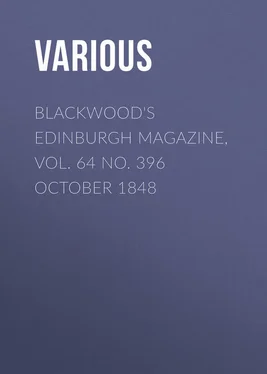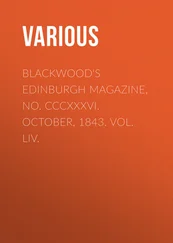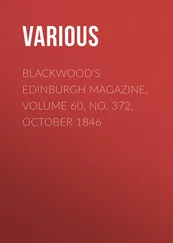Various - Blackwood's Edinburgh Magazine, Vol. 64 No. 396 October 1848
Здесь есть возможность читать онлайн «Various - Blackwood's Edinburgh Magazine, Vol. 64 No. 396 October 1848» — ознакомительный отрывок электронной книги совершенно бесплатно, а после прочтения отрывка купить полную версию. В некоторых случаях можно слушать аудио, скачать через торрент в формате fb2 и присутствует краткое содержание. Издательство: Иностранный паблик, Жанр: periodic, foreign_edu, Путешествия и география, на английском языке. Описание произведения, (предисловие) а так же отзывы посетителей доступны на портале библиотеки ЛибКат.
- Название:Blackwood's Edinburgh Magazine, Vol. 64 No. 396 October 1848
- Автор:
- Издательство:Иностранный паблик
- Жанр:
- Год:неизвестен
- ISBN:нет данных
- Рейтинг книги:4 / 5. Голосов: 1
-
Избранное:Добавить в избранное
- Отзывы:
-
Ваша оценка:
- 80
- 1
- 2
- 3
- 4
- 5
Blackwood's Edinburgh Magazine, Vol. 64 No. 396 October 1848: краткое содержание, описание и аннотация
Предлагаем к чтению аннотацию, описание, краткое содержание или предисловие (зависит от того, что написал сам автор книги «Blackwood's Edinburgh Magazine, Vol. 64 No. 396 October 1848»). Если вы не нашли необходимую информацию о книге — напишите в комментариях, мы постараемся отыскать её.
Blackwood's Edinburgh Magazine, Vol. 64 No. 396 October 1848 — читать онлайн ознакомительный отрывок
Ниже представлен текст книги, разбитый по страницам. Система сохранения места последней прочитанной страницы, позволяет с удобством читать онлайн бесплатно книгу «Blackwood's Edinburgh Magazine, Vol. 64 No. 396 October 1848», без необходимости каждый раз заново искать на чём Вы остановились. Поставьте закладку, и сможете в любой момент перейти на страницу, на которой закончили чтение.
Интервал:
Закладка:
I felt that there was no wisdom in stammering and blushing out denials and equivocations; so I stretched my hand to Sir Sedley, took up my hat, – and went. Instinctively I bent my way to my father's house. I had not been there for many days. Not only had I had a great deal to do in the way of business, but I am ashamed to say that pleasure itself had so entangled my leisure hours, and Miss Trevanion especially so absorbed them, that, without even uneasy foreboding, I had left my father fluttering his wings more feebly and feebly in the web of Uncle Jack. When I arrived in Russell Street, I found the fly and the spider cheek by jowl together. Uncle Jack sprang up at my entrance, and cried, "Congratulate your father, congratulate him . No; congratulate the world!"
"What, Uncle!" said I, with a dismal effort at sympathising liveliness, "is the 'Literary Times' launched at last?"
"Oh, that is all settled – settled long since. Here's a specimen of the type we have chosen for the leaders." And Uncle Jack, whose pocket was never without a wet sheet of some kind or other, drew forth a steaming papyral monster, which in point of size was to the political "Times" as a mammoth may be to an elephant. "That is all settled. We are only preparing our contributors, and shall put out our programme next week or the week after. No, Pisistratus, I mean the Great Work."
"My dear father, I am so glad. What! it is really sold then?"
"Hum!" said my father.
"Sold!" burst forth Uncle Jack. "Sold – no, sir, we would not sell it! No; if all the booksellers fell down on their knees to us, as they will some day, that book should not be sold! Sir, that book is a revolution – it is an era – it is the emancipator of genius from mercenary thraldom; – THAT BOOK! – "
I looked inquiringly from uncle to father, and mentally retracted my congratulations. Then Mr Caxton, slightly blushing, and shyly rubbing his spectacles, said, "You see, Pisistratus, that though poor Jack has devoted uncommon pains to induce the publishers to recognise the merit he has discovered in the 'History of Human Error,' he has failed to do so."
"Not a bit of it; they all acknowledge its miraculous learning – its – "
"Very true; but they don't think it will sell, and therefore most selfishly refuse to buy it. One bookseller, indeed, offered to treat for it if I would leave out all about the Hottentots and Caffres, the Greek philosophers and Egyptian priests, and, confining myself solely to polite society, entitle the work 'Anecdotes of the Courts of Europe, ancient and modern.'"
"The wretch!" groaned Uncle Jack.
"Another thought it might be cut up into little essays, leaving out the quotations, entitled 'Men and Manners.'"
"A third was kind enough to observe, that though this particular work was quite unsaleable, yet as I appeared to have some historical information, he should be happy to undertake a historical romance from 'my graphic pen' – that was the phrase, was it not, Jack?"
Jack was too full to speak. – "Provided I would introduce a proper love-plot, and make it into three volumes post octavo, twenty-three lines in a page, neither more nor less. One honest fellow at last was found, who seemed to me a very respectable and indeed enterprising person. And after going through a list of calculations, which showed that no possible profit could arise, he generously offered to give me half of those no-profits, provided I would guarantee half the very visible expenses. I was just meditating the prudence of accepting this proposal, when your uncle was seized with a sublime idea, which has whisked up my book in a whirlwind of expectation."
"And that idea?" said I despondently.
"That idea," quoth Uncle Jack, recovering himself, "is simply and shortly this. From time immemorial authors have been the prey of the publishers. Sir, authors have lived in garrets, nay, have been choked in the street by an unexpected crumb of bread, like the man who wrote the play, poor fellow!"
"Otway," said my father. "The story is not true – no matter."
"Milton, sir, as every body knows, sold Paradise Lost for ten pounds – ten pounds, sir! In short, instances of a like nature are too numerous to quote. But the booksellers, sir, – they are leviathans – they roll in seas of gold. They subsist upon authors as vampires upon little children. But at last endurance has reached its limit – the fiat has gone forth – the tocsin of liberty has resounded – authors have burst their fetters. And we have just inaugurated the institution of 'The Grand Anti-Publisher Confederate Authors' Society,' by which, Pisistratus – by which, mark you, every author is to be his own publisher; that is, every author who joins the Society. No more submission of immortal works to mercenary calculators, to sordid tastes – no more hard bargains and broken hearts! – no more crumbs of bread choking great tragic poets in the streets – no more Paradises Lost sold at £10 a-piece! The author brings his book to a select committee appointed for the purpose; men of delicacy, education, and refinement – authors themselves – they read it, the Society publish; and after a modest commission towards the funds of the Society, the treasurer hands over the profits to the author."
"So that in fact, Uncle, every author who can't find a publisher any where else, will of course come to the Society. The fraternity will be numerous!"
"It will indeed."
"And the speculation – ruinous?"
"Ruinous, why?"
"Because in all mercantile negotiations it is ruinous to invest capital in supplies which fail of demand. You undertake to publish books that booksellers will not publish. Why? because booksellers can't sell them! It is just probable that you'll not sell them any better than the booksellers. Ergo, the more your business the larger your deficit. And the more numerous your society, the more disastrous your condition. Q.E.D."
"Pooh! The select committee will decide what books are to be published."
"Then where the deuce is the advantage to the authors? I would as lief submit my work to a publisher as I would to a select committee of authors. At all events, the publisher is not my rival; and I suspect he is the best judge, after all, of a book – as an accoucheur ought to be of a baby."
"Upon my word, nephew, you pay a bad compliment to your father's great work, which the booksellers will have nothing to do with."
That was artfully said, and I was posed; when Mr Caxton observed, with an apologetic smile —
"The fact is, my dear Pisistratus, that I want my book published without diminishing the little fortune I keep for you some day. Uncle Jack starts a society so to publish it. – Health and long life to Uncle Jack's society! One can't look a gift-horse in the mouth."
Here my mother entered, rosy from a shopping expedition with Mrs Primmins; and in her joy at hearing that I could stay dinner, all else was forgotten. By a wonder, which I did not regret, Uncle Jack really was engaged to dine out. He had other irons in the fire besides the "Literary Times" and the "Confederate Authors' Society;" he was deep in a scheme for making house-tops of felt, (which, under other hands, has, I believe, since succeeded;) and he had found a rich man (I suppose a hatter) who seemed well inclined to the project, and had actually asked him to dine and expound his views!
CHAPTER XXVIII
Here we three are seated round the open window – after dinner – familiar as in the old happy time – and my mother is talking low that she may not disturb my father, who seems in thought. —
Cr-cr-crrr-cr-cr! I feel it – I have it. – Where! What! Where! Knock it down – brush it off! For Heaven's sake, see to it! – Crrrr-crrrrr – there – here – in my hair – in my sleeve – in my ear. – Cr-cr.
Читать дальшеИнтервал:
Закладка:
Похожие книги на «Blackwood's Edinburgh Magazine, Vol. 64 No. 396 October 1848»
Представляем Вашему вниманию похожие книги на «Blackwood's Edinburgh Magazine, Vol. 64 No. 396 October 1848» списком для выбора. Мы отобрали схожую по названию и смыслу литературу в надежде предоставить читателям больше вариантов отыскать новые, интересные, ещё непрочитанные произведения.
Обсуждение, отзывы о книге «Blackwood's Edinburgh Magazine, Vol. 64 No. 396 October 1848» и просто собственные мнения читателей. Оставьте ваши комментарии, напишите, что Вы думаете о произведении, его смысле или главных героях. Укажите что конкретно понравилось, а что нет, и почему Вы так считаете.












